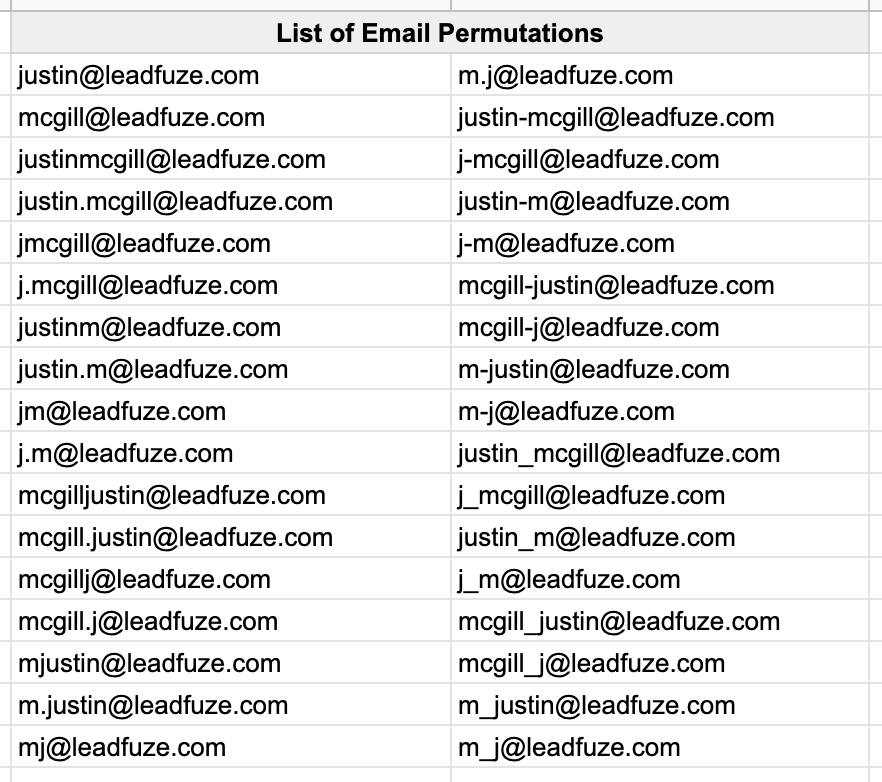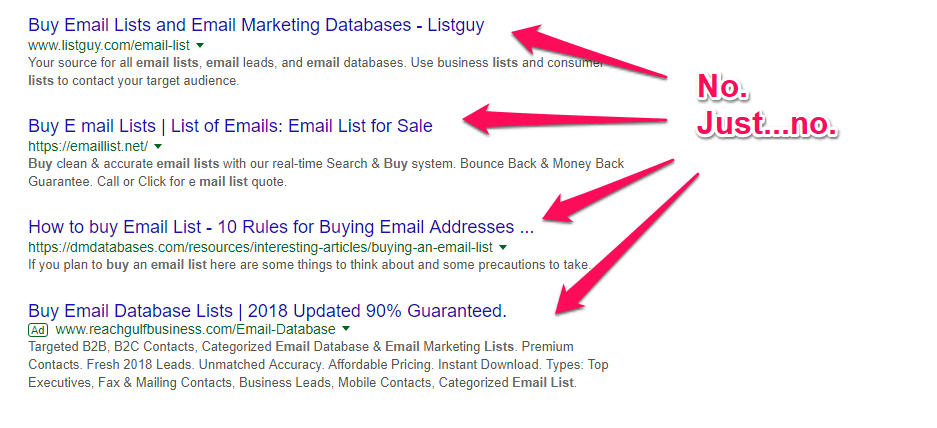20 Free Suggestions For Choosing Email List Sellers
Wiki Article
What Should I Think About When Purchasing Cpa Email Lists?
When purchasing an CPA (Certified Public Accountant) email list, it's crucial to examine a variety of key aspects to ensure that the list is high-quality, compliant to legal standards and pertinent to your goals in marketing. Be aware of these elements: Quality and accuracy of the data
Source of information: Find out the source of the list. Reputable suppliers usually collect information from directories for professional use, databases, as well as trade associations. Avoid lists that are created by scraping or other untrustworthy sources. They may include outdated information.
Verification Process: Check that the email list has been recently verified. This helps reduce bounce rates and makes sure you are reaching active, valid email addresses. It is important to inquire about how often this list is updated as CPAs frequently change companies and positions.
Segmentation/Filters Filters and Segmentation: A CPA List should have options to be segmented by geography (city or province or country), specificization (e.g. accounting, auditing or financial planning), number of years in business, or the size of the company. These variables can be utilized to increase the impact of marketing campaigns, allowing more specific selection of.
2. Legal Regulations
Data Privacy Laws â Ensure your email list is compliant with data protection laws like the General Data Protection Regulation, the California Consumer Privacy Act or any other local regulations. The list must contain the email addresses acquired legally and with consent.
Compliance with CAN-SPAM Act: In the case of U.S. email campaigns, the list should be compliant with the CANSPAM Act, which governs commercial email communication. It is crucial to offer opt-out options and refrain from making use of misleading subject lines or other content. Failure to comply could result in fines and legal issues.
Opt-in Consent: Check that email addresses were obtained via opt-in consent. This means that the users were willing to receive emails from marketing from third-party companies. This increases engagement and reduces complaints about spam.
3. Provider Reputation
Reputable Provider: Study the reputation of the service thoroughly. To assess the experience of previous clients, check reviews, case studies, as well as testimonials. Established companies are more likely to have precise information.
Transparency: Providers should be transparent in the way they collect information and when it is changed. If the provider's methods are not clearly explained, that is a major red signal.
Customer Support: If you need assistance with customizing your list troubleshooting or understanding the rules of compliance, it is important to provide a reliable customer support. Support can be a time-saver and reduce the effort involved in the campaigning process.
4. Cost and ROI
Pricing Models. Providers offer different pricing options. Some charge for each contact; others offer per-contact fees or a subscription. Examine the costs in relation to the expected return on investment and then weigh your price against the value of your list.
Refund Policy: Ask whether the company has an exchange or refund policy for the event that a significant amount of email addresses are inaccurate or inactive. A guarantee gives you peace-of-mind.
Cost vs. Quality: Don't solely focus on the price. It's tempting to buy a cheaper list, but if its quality is poor and the result is low engagement as well as high bounce rates. Make sure to choose lists that offer value in terms of data precision and segmentation.
5. Data Use and Ownership
Buy the list once or purchase it several times. Costs for databases that are solely used might be less expensive, however you will have greater flexibility in the long run if you buy the data.
Shared Lists vs. Exclusive lists: Determine whether the email list is only for you or shared with multiple buyers. Shared Lists: Decide whether the email list is only to you, or if it's shared with other customers. Shared lists could lead to audience fatigue, if recipients are constantly bombarded with marketing emails.
6. Data Integration and Format
CRM Compatibility. Check that your list is delivered in a format that works with the CRM software you use or to promote email marketing like CSV. It permits easy importation and managing your information.
Easy to Use What is the simplest way to have the information be segmented or controlled once they have been in your system? A well-organized list can in making personalization and targeting more effective.
7. Ethical Considerations
Relevance of Content CPAs are highly-skilled professionals Therefore, it's essential to provide relevant, valuable content. Sending irrelevant messages may affect your brand's image or increase complaints about spam.
Beware of over-emailing. Be mindful of the frequency with which you send emails to contacts on the list. Insufficient communication could lead to unsubscribes and spam complaints that can damage the reputation of your sender.
Also, you can read our conclusion.
Prioritize the quality of data, legal compliance and the reputation of the provider when you purchase CPA lists. Consider legal compliance, data quality, and reputation of the provider when purchasing a CPA list to ensure your investment is worth it. A well-planned segmentation process, ethical practices and targeted marketing will maximize engagement and ROI while preserving a positive brand image. Check out the expert cpa email list for website advice.

What Do I Need To Think About When Purchasing An Urgent Email List?
To determine if an urgent care email database is efficient in accuracy, complete, and pertinent to your marketing goals You must consider various elements. Consider these key elements: Quality and Accuracy of the Data
Source of Data: Make sure the data is collected from reliable sources, for example, medical associations, healthcare databases or professional directories. Avoid lists that are compiled using scraping or other unreliable methods since they may contain inaccurate or outdated information.
Verification: Confirm if the email list is frequently updated. A reliable provider follows an extensive verification process to remove old, invalid duplicate and invalid email addresses. This process ensures an excellent delivery rate and lowers bounce rates.
Segmentation & Targeting Segmentation and Targeting details such as the location of the clinic (e.g. city or state, or even a region) as well as its size and any particularizations (e.g. diagnostics or pediatrics, etc.)) and the roles of important decision-makers (e.g. doctors, practice owners, etc.). The targeted lists will increase the value of your outreach and boost engagement rates.
2. Legal Regulations
Data Privacy Laws â Ensure that your list complies fully with the applicable data protection laws. This includes the General Data Protection Regulations (GDPR) for Europe as well as the California Consumer Privacy Acts (CCPA) for the U.S. and other local laws. Email addresses must be collected legally and with consent.
CAN SPAM Act: In the U.S.A. all marketing emails are subject to the CAN SPAM Act. Incorporate the physical address of your company, avoid false subject lines, and offer an easy opt-out mechanism. Non-compliance could lead to penalties and could damage your company's reputation.
Opt-in Consent: Ensure that all email addresses on the list were acquired with explicit permission. This means that the recipients have explicitly agreed to receive marketing messages. This reduces the chance for complaints about spam, as well as any legal issues.
3. Provider Reputation
Establish Provider: Select a provider who has an established track record of providing quality, compliant email lists. You can evaluate a provider's reliability by looking at reviews, testimonials and cases studies.
Transparency. Providers need to be transparent about the way in which the data is obtained, as well as how often they are updated. If the company isn't able to provide clear answers about their methods of collecting data, it may indicate poor-quality data.
Customer support is vital for any business that requires assistance with compliance issues or technical issues, or even customizations. A company that is responsive can to help you get the best value from your list.
4. Return on investment (ROI) and cost
Email list providers typically provide a variety of pricing options that include flat-fees, pay-per-contact or flat-fee. Pricing models must be evaluated against your marketing budget and expectations of ROI. You must balance the price of the list against the validity and accuracy of data.
Refund and Replacement Policy: The majority of trustworthy providers offer a return or a replacement policy in the event that a substantial portion of their email addresses cannot be delivered or are invalid. Be sure to understand the conditions and terms of the policy prior to you make a purchase.
Value for money: Instead of selecting the most affordable option, focus on lists that provide value with precise data and a thorough segmentation. By investing in lists of high quality will increase engagement and provide a better return on investment.
5. Data Ownership and Use
Single-Use Vs. Multi-Use: Decide whether the list is used only for one campaign or for multiple campaigns. Multi-use lists are more valuable, especially if your plan is to launch an array of outreach campaigns.
Shared Lists vs. Exclusive lists: Determine if the list is exclusive to your company or if it is shared with other buyers. Shared Lists Decide if this list belongs to you only or shared with other buyers. The shared list can cause the recipients becoming tired, as they might receive messages from multiple businesses.
6. Integration and Data Format
CRM Compatibility: Make sure that the list of emails is sent in a format that works with your customer relationship management (CRM) or marketing email platform like CSV or Excel. This will allow for a seamless integration and enable you to start your campaign quickly.
User-friendliness: The email list must be easy to manage and segment based on certain requirements. Personalization and targeting can be more effective if you have a well-organized list.
7. Ethical Considerations
Relevance of Content Health professionals working in urgent care are often busy, therefore your outreach should be relevant and useful. Adjust your message to meet their needs. For example, if you are promoting medical equipment, supplies or healthcare technologies that align with the operations of urgent care ensure that your messages are tailored to. Sending irrelevant content could harm your brand's reputation and reduce engagement.
Avoid spam: Limit the frequency of your emails. Unsolicited or excessive emails can result in spam complaints and lower your sender reputation.
Conclusion
When buying an urgent care email list, focus on accuracy of the data, legal compliance, and the reputation of the company. Lists should be segmented regularly and adhere to data privacy laws. Utilizing a well-targeted, high-quality list and sending content that is relevant, you can maximize the engagement of your customers and boost the return on investment. See the recommended urgent care email list for website guide.
